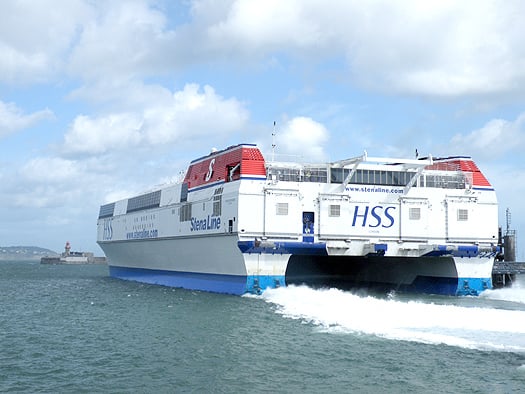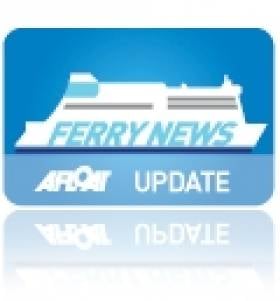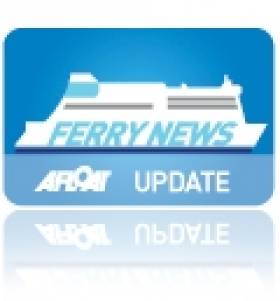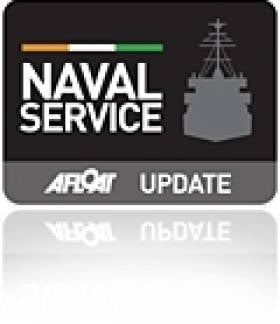Displaying items by tag: Stena Adventurer
Dublin Route Reduced to Single-Ship Service
#FERRIES – Stena Line's two-ship operated Dublin-Holyhead route is to be reduced to a single vessel service as from tomorrow, due to annual dry-docking requirements, writes Jehan Ashmore.
Stena Nordica (2000/24,206grt) is to go off the route for a refit from 5th-19th January. The last sailing scheduled for the ferry will be from Dublin Port at 02.15hrs on 5th January. She is scheduled to return on the 3 hour 15 minute route on 19th January with the 16.00hrs sailing from the capital.
Fleetmate Stena Adventurer will continue operating to her normal schedule while the Japanese ro-pax vessel is away for the dry-docking period. For information on route sailings schedules click HERE.
During the off-peak winter season, particularly during the months of January and February, it is common practice for ferry operators to take vessels off-service for annual dry-docking.
In addition to Stena Line, rivals Irish Ferries today started a fleet logistic operation as vessels are taken off and on routes for dry-docking and replaced with temporary tonnage, as previously reported on afloat.ie
Dun Laoghaire-Holyhead (HSS) High Speed Sailings Close
The core reason to withdraw the HSS on the 120-minute route which is not to re-open until the 2012 season, rests with the high operating costs of the fuel-thirsty fast-ferry which is powered by four gas-turbine engines. In addition the route's generated most of its turnover during the period May-September, leaving the remaining months unsustainable, as such the company wants the route to be seasonal-only in the long-term.

HSS Stena Explorer departs Dun Laoghaire Harbour on her final sailing this season. Photo: Jehan Ashmore
Passengers and freight customers will instead need to use the company's other Dublin Bay route between Dublin Port and Holyhead. The 3 hour 15-minute central corridor route is served by two ro-pax vessels, Stena Adventurer (2004/43,532 grt) and Stena Nordica (2000/24,206 grt) which operate to a year-round schedule, for times click HERE.
What is not certain is the precise date for resumption of Dun Laoghaire-Holyhead services as Stena Line have only indicated that they hope to reopen in April or May nor it is outlined as to what type of fast-craft would operate the route next year.
With today's break in service for at least the next six months, this is the most significant absence of the revolutionary HSS (High Speed Sea Service) 1500 fast-ferry which made her official maiden voyage on the route from Dun Laoghaire on 10th April 1996. The only other notable occasions when the HSS was off-service was for the short spells to allow for annual dry-docking, refit, repairs or when the route in recent years was partially operated by Stena Lynx III.
The 1500 referred to the number of passengers the Stena Explorer could accommodate. She was the first of the three Finish-built HSS 1500 catamaran vehicle capable carrying craft to enter service on three routes from the UK. The next sister completed HSS Stena Discovery entered service in the same year between Harwich-Hook van Holland and the final of the trio HSS Stena Voyager entered the Belfast-Stranraer route in 1997. Several years ago the HSS ceased operating on the Dutch route and the HSS currently serving on the North Channel is due to be replaced by conventional ferries in mid-November as previously reported on Afloat.ie, to read more click HERE.
On the Dun Laoghaire-Holyhead service the HSS enjoyed the boom years, and at its peak there were five daily round trips. From 2006 onwards the routes fortunes began to decline due to the ending of duty-free sales, competition from low-cost airlines, and the increasing cost of fuel.
In order to stave off further losses, a series of cost cutting measures were implemented over the next five years. Firstly the sailing frequency was reduced then the passage times were increased to reduce fuel consumption at the expense of faster crossings. In addition the company resorted to withdrawing the Stena Explorer during the shoulder months surrounding the summer and as previously mentioned these sailings were covered by the Stena Lynx III.
When the Stena Explorer returned for the summer months, the Stena Lynx III switched to her normal high-season spell on Rosslare-Fishguard sailings in tandem with regular route vessel Stena Europe. This year she served as usual on the St. Georges Channel route with the last high-season sailing completed on 4 September.
Stena Lynx III remained initially at Fishguard until making a repositioning voyage to Dun Laoghaire via the Kish Lighthouse last Wednesday. She berthed adjacent to the now disused HSS berth link-span on St. Michaels Wharf. The Tasmanian built craft has spent previous winter layover periods in Dublin and last year in Dun Laoghaire whereas the Stena Explorer is expected to do so in her home port of Holyhead.
At the neighbouring Carlisle Pier, the former terminal where numerous steam-packets, 'mailboats' and the conventional Sealink/British Rail car-ferries served (the last being the Stena Adventurer better known as St. Columba built in 1977) there are plans for a national diaspora museum.
The centrepiece landmark building would form as part of the masterplan proposed by the Dun Laoghaire Harbour Company as part of a concerted effort to offset the reduced role of ferry operations. The masterplan is also to attract cruiseship business amongst other proposals envisaged.
- Dublin Port
- Dun Laoghaire Harbour Company
- Cruise Liners
- HSS Stena Explorer
- Dun LaoghaireHolyhead
- Stena Lynx III
- Stena Line
- Port of Dublin
- Ports and Shipping News
- Ferry news
- Stena Explorer
- HSS
- St.Michaels Wharf
- Dun Laoghaire Harbour News
- Stena Adventurer
- Irish Sea ferry news
- Cruise ships
- Carlisle Pier Dun Laoghaire
- Stena Nordica
- Closure of HSS sailings
- HSS (High Speed Sea Service)
- Dun Laoghaire masterplan
- Diaspora Museum Dun Laoghaire
The operation was spearheaded by the ARW with the support of a Naval Service coastal patrol vessel (CPV) and also Air Corps helicopters. High-speed tactical assault craft with ARW teams on board conducted manoeuvres while air-borne teams fast-roped from helicopters onto the deck of the Stena Adventurer. To see photos of the ARW team in action click HERE.
The exercise was designed to enhance the capacity of the Defence Forces to provide the State with a highly specialised maritime armed intervention capability.
Last month the Naval Service conducted close quarter manoeuvres in 'Operation Quixote' off the south-west coast. The exercise involved the entire naval fleet except for the flagship LE Eithne, which performed in gunnery practice, simulated air attacks from the Air Corps and armed naval boarding parties.































































